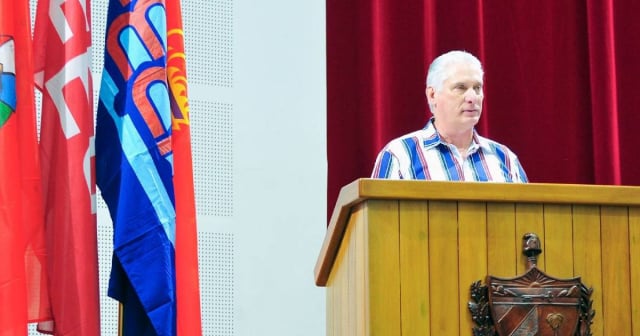The Cuban regime, deeply patriarchal, remains determined to avoid the use of the word “feminicide” when talking about the sexist crimes that men commit on women.
Hidden behind semantic arguments and cheap politicking, the communist totalitarianism prevailing in Cuba avoids talking about gender violence with the terminology used and accepted internationally by all countries that recognize the existence and combat this scourge.
However, Havana, which boasts of its Family Code as the most advanced in the world and grotesquely exhibits a supposed normalization of gender identities, through “congas” and conferences given by Mariela Castro Espín -daughter of the dictator Raul Castro-, does not accept that there is talk of femicides in Cuba.
“The anti-Cuban subversive platforms try to impose the matrix that feminicide exists in Cuba, a term that indicates alleged state inaction in the face of gender-based violent acts. We can categorically assure here that this is a media construction completely foreign to Cuban reality,” the president stated categorically this Friday. Miguel Diaz-Canel.
In his closing speech at the congress of the Federation of Cuban Women (FMC), the also first secretary of the Communist Party of Cuba (PCC) He took the opportunity to defend the measures adopted by his government to address the “murders of women,” which he refuses to classify as “femicides.”
The justification for not doing so, according to Díaz-Canel, is that there is no “state inaction” in the face of these crimes. The subterfuge aims to cover up the deeply patriarchal and sexist nature that underlies Cuban society and, especially, in the virile imaginary developed by the propaganda of the so-called “revolution” and the indoctrination del PCC.
“There can be no impunity in Cuba, much less for crimes motivated by any type of discrimination and above all against women. The legal norms that I mentioned previously have very precise sections that classify as crimes the most diverse figures that can undermine the physical, psychological or moral integrity of women," defended the president, while acknowledging that last year Cuba tripled the number of people convicted of sexist murders compared to the 2022 registry.
In 2023, Cuban courts prosecuted “61 individuals responsible for the murder of women.” According to Díaz-Canel, in 93% of the cases, the penalties exceeded 20 years in prison, while five cases merited life imprisonment. “These are just a couple of facts that illustrate the zero tolerance of the Cuban State towards this type of behavior,” he stressed.
“The court system, in accordance with the law, provides high and exemplary sentences for the perpetrators of this type of crimes,” said the president, calling for “confronting these crimes” with the participation of law enforcement officers and through education and community action.
Despite recognizing that cases of gender violence on the island “appear with regrettable frequency,” Díaz-Canel argued that the “enemies of the revolution (...) conveniently and tendentiously manipulate” the figures.
For their part, the independent feminist platforms Yo Sí Te Creo and Alas Tensas confirmed a total of 88 sexist murders in 2023, more than double those they recorded the previous year.
Without specifying the exact period in which they occurred, the Attorney General's Office recognized that at the end of October 2023, 117 sexist crimes had been recorded on the island. The official data also did not clarify whether the figure includes cases in the investigation process and already sentenced.
“As of this March 8, 2024, 12 femicides have already occurred in Cuba, the number of missing women has increased and the 73 political prisoners continue to be violated in prison,” the Cuban feminist magazine Alas Tensas denounced this Saturday.
The Cuban Alliance for Inclusion (ACI) also launched a message through its social networks for Women's Day. "Today, March 8, we make visible the femicides that occurred during the first months of the year in Cuba, we call on the relevant authorities so that these events do not go unpunished."
In relation to this scourge, Díaz-Canel abides by the dictates of sexologist Castro Espín. “We do not have, for example, femicides. Because Cuba is not a violent country,” said the director of the state National Center for Sexual Education in 2015 (CENESEX), adding that it was “an effect of the Revolution.”
What do you think?
SEE COMMENTS (1)Filed in:
